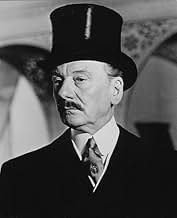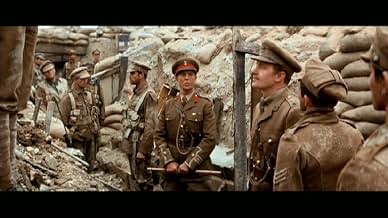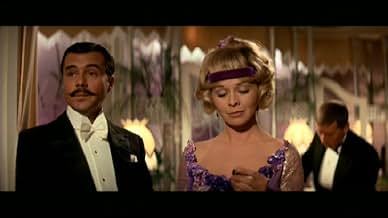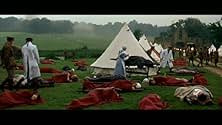Füge eine Handlung in deiner Sprache hinzuThe working-class Smiths change their initially sunny views on World War I after the three boys of the family witness the harsh reality of trench warfare.The working-class Smiths change their initially sunny views on World War I after the three boys of the family witness the harsh reality of trench warfare.The working-class Smiths change their initially sunny views on World War I after the three boys of the family witness the harsh reality of trench warfare.
- Regie
- Drehbuch
- Hauptbesetzung
- 6 BAFTA Awards gewonnen
- 8 Gewinne & 8 Nominierungen insgesamt
Empfohlene Bewertungen
In Flanders fields the poppies blow
Between the crosses, row by row,. . .
If yea break faith with us who die
We shall not sleep, though poppies grow
In Flanders fields
Anyway, shortly after WWI, in the early nineteen-twenties, the red poppy became the symbol of remembering and honoring the heroic dead. The day for remembrance became November 11, the date World War One ended. These days, I fear, most people in the United States think of November 11 not as "Remembrance Day" or "Armistice Day" but more as just Veteren's Day. It rarely even falls on November 11, and, when it does, most Americans view it simply as time off work.
As critic Roger Ebert once said, OH! WHAT A LOVELY WAR really isn't a movie at all, but a theatrical tableau. Like many a British muscial review, it contains little plot, much spirited music, and--in this case--the story of World War I. Some portions, as even director Richard Attenborough admitted, go on too long; however, so many other portions are just brilliant. Like other Attenborough movies, one hates to dislike it because its subject matter is so worthwhile and commands respect (will anyone do a remembrance film honoring the fallen dead of the present Iraqui conflict?) I know I gave it an 8, but I must say I don't quite know how to rate a movie like this one. There's nothing else in cinema like it.
Until I saw the movie, I didn't realize that there was some special music that accompanied WWI. It's music that now brings a tear whenever I hear it. The portrayal of pompous generals and their subservient minions, as they are posting the numbers of deaths and casualties for the day, is beautifully done. They were simply putting up numbers. But each number was often a death. A death of a promising young person. This movie makes war appear as brutal as it can really be. The poor always die first. It would be nice if international law demanded that the political and military leaders of a country be required to send their own children into war first. If that were the case, there would likely be no more war.
There are a number of memorable scenes and songs that go with them - the scene in the estaminet is incredibly moving. The Church parade, especially the quote from the vicar are noteworthy.
There are many vignettes from the movie which evoke a very strong emotional response. Some scenes do not come off as they were probably intended - a difficulty when trying to use allegory and allusion to make a point.
If you have not seen it - find it and watch it.
If you get a chance to see the play - which I found much more direct in its anti war sentiment - definitely go and see it.
The central characters are the Smith family - several sons and nephews, a grandad, mother, wives and younger children. All have tickets for the game, welcomed in at Douglas Haig's booth (Haig puts his own words to 'I do like to be beside the seaside' = 'I do love to see a man in khaki'). They are the routes by which we follow the various battles and conflicts through the war, punctuated by a soundtrack of popular songs of the period ('It's a Long Way to Tipperary', 'Keep The Home Fires Burning', 'and so on).
Oh! What a Lovely War manages to be daring, funny, and moving, and boasts a starry set of cameos including Olivier, Gielgud, Richardson, Maggie Smith, Dirk Bogarde, Kenneth More, Ian Holm, and Vanessa Redgrave. It covers all of the conflict, from the assassination of the Archduke of Austria, through to the Christmas truce in the trenches, to the war's conclusion. Poppies play their part, as well they might, to indicate the scale of loss of life; and a final tracking shot on the Sussex Downs attempts to give some indication of the wanton destruction of 'cannon fodder' by the powers-that-be.
As a pure war film, this would never work. As a satirical musical, it stands up extremely well, and has many memorable moments to reward the viewer when they see the film again and again. Attenborough himself of course would go on to greater things, culminating in the Oscar-winning Gandhi some 13 years later, but this is an excellent debut, sure of itself and without getting bogged down in cloying sentimentality.
Wusstest du schon
- WissenswertesThe song "La Chanson de Craonne" ("Adieu la Vie"), sung by Pia Colombo (Estaminet Singer) in this movie, commemorates a mutiny in 1917 by French troops. Merely singing it was considered an act of mutiny, and it was banned in France until 1974. During the war, a reward of one million francs and immediate honorable release from the Army was offered for the identity of the author, but never claimed.
- PatzerSir Edward Grey (Ralph Richardson) is shown early in the film being accompanied by his wife, described in the credits as Lady Pamela Grey. In fact, Grey did not marry Pamela (nee Wyndham, and the widow of Lord Glenconer) until 1922.
- Zitate
Soldier Singer: It was Christmas Day in the cookhouse, the happiest time of the year, Men's hearts were full of gladness and their bellies full of beer, When up popped Private Shorthouse, his face as bold as brass, He said We don't want your Christmas pudding, you can stick it up your... tidings of co-omfort and joy, comfort and joy, o-oh ti-idings of co-omfort and joy. It was Christmas Day in the harem, the eunuchs were standing 'round, And hundreds of beautiful women were stretched out on the ground, Along came the big bad Sultan, and gazed on his marble halls, He said Whaddya want for Christmas boys, and the eunuchs answered... tidings of co-omfort and joy, comfort and joy, o-oh ti-idings of comfort and joy.
- Crazy CreditsOpening credits prologue: The principal statements made by the historical characters in this film are based on documentary evidence and the words of the songs are those sung by the troops during the First World War
- VerbindungenFeatured in Love Tory: A Film Portrait of Alan Clark (1993)
- SoundtracksOh, It's a Lovely War
(uncredited)
Written by John Long and Maurice Scott
Performed by John Mills and chorus
Top-Auswahl
- How long is Oh! What a Lovely War?Powered by Alexa
Details
- Erscheinungsdatum
- Herkunftsland
- Sprachen
- Auch bekannt als
- Kakav divan rat!
- Drehorte
- Produktionsfirma
- Weitere beteiligte Unternehmen bei IMDbPro anzeigen
Box Office
- Bruttoertrag in den USA und Kanada
- 801.591 $
Zu dieser Seite beitragen

































